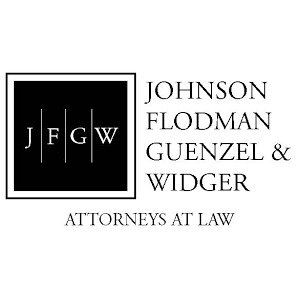Best International Trade Law Lawyers in Lincoln
Share your needs with us, get contacted by law firms.
Free. Takes 2 min.
List of the best lawyers in Lincoln, United States
About International Trade Law in Lincoln, United States
International Trade Law governs the rules and customs for handling trade between countries. In Lincoln, Nebraska, it plays a crucial role due to the city’s involvement in global commerce and trade. This area of law encompasses a broad range of legal disciplines, including international commercial agreements, import/export regulations, and the rules established by bodies like the World Trade Organization (WTO). Lawyers specializing in International Trade Law in Lincoln help businesses navigate complex cross-border legal landscapes to ensure compliance and smooth transactions.
Why You May Need a Lawyer
People often require legal assistance in International Trade Law for various reasons, such as:
- Understanding and complying with export control regulations.
- Negotiating and drafting international sales contracts.
- Resolving trade disputes or issues related to tariff classifications.
- Addressing customs compliance or penalty mitigation.
- Managing trade sanctions and embargo issues.
- Obtaining proper licenses for importing/exporting goods.
- Legal issues related to international supply chain management.
Local Laws Overview
In Lincoln and the broader United States, International Trade Law is influenced by federal statutes and regulations, as well as international treaties and agreements. Key laws include:
- The Export Administration Regulations (EAR), which govern the export of certain items and information.
- The International Traffic in Arms Regulations (ITAR), concerning defense-related products and services.
- Customs regulations managed by U.S. Customs and Border Protection (CBP).
- Sanctions enforced by the Office of Foreign Assets Control (OFAC).
- Trade agreements such as the North American Free Trade Agreement (NAFTA) and its replacement, the United States-Mexico-Canada Agreement (USMCA).
Frequently Asked Questions
What is the role of a trade lawyer?
A trade lawyer assists with compliance, dispute resolution, contract negotiations, and regulatory guidance for businesses engaged in international trade.
Do I need a lawyer to export products from Lincoln?
While not legally required, hiring a lawyer ensures compliance with complex export regulations and helps avoid potential penalties or delays.
How can I resolve a trade dispute with a foreign company?
A trade lawyer can offer services in negotiation, mediation, arbitration, or litigation depending on the nature of the dispute and the terms of any applicable agreements.
What are the consequences of violating import/export laws?
Penalties can include fines, seizure of goods, and restrictions on future imports or exports. In severe cases, criminal charges may be applicable.
What is a tariff, and how is it applied?
A tariff is a tax imposed on imports, calculated based on the value, type, or quantity of the goods. It influences the cost structure of imported goods.
How do trade sanctions affect businesses?
Trade sanctions restrict transactions with certain countries or entities, impacting supply chains and requiring businesses to adapt quickly to comply.
What steps do I need to take to import goods into the United States?
Key steps include determining the correct classification and tariff for goods, ensuring compliance with customs regulations, and acquiring necessary licenses or permits.
What is the significance of the Harmonized System (HS) code?
The HS code is an international product classification system used to determine the correct tariff and regulatory obligations for importing/exporting goods.
Can a lawyer help with understanding a free trade agreement?
Yes, lawyers can interpret and ensure compliance with free trade agreements, advising on qualification, tariff reductions, and documentation requirements.
What are dual-use goods, and why are they regulated?
Dual-use goods can be used for both civilian and military purposes. They are regulated to prevent their misuse or diversion to undesirable entities.
Additional Resources
For more assistance in International Trade Law, consider the following resources:
- U.S. Department of Commerce’s International Trade Administration (ITA)
- U.S. Customs and Border Protection (CBP) resources
- Export.gov, for guidance on export processes and compliance
- Local trade or business organizations in Lincoln
- Lincoln Bar Association for a directory of local trade lawyers
Next Steps
If you need legal assistance in International Trade Law, consider the following steps:
- Assess the specific trade-related issue or requirement you are facing.
- Research and create a shortlist of qualified International Trade Lawyers in Lincoln.
- Schedule a consultation to discuss your needs and ensure their expertise aligns with your requirements.
- Collect all relevant documentation to provide your lawyer with the complete background for effective assistance.
- Discuss billing arrangements and ensure a clear understanding of legal fees and services provided.
Taking these steps will help ensure that you receive expert legal guidance tailored to your specific international trade situation.
Lawzana helps you find the best lawyers and law firms in Lincoln through a curated and pre-screened list of qualified legal professionals. Our platform offers rankings and detailed profiles of attorneys and law firms, allowing you to compare based on practice areas, including International Trade Law, experience, and client feedback.
Each profile includes a description of the firm's areas of practice, client reviews, team members and partners, year of establishment, spoken languages, office locations, contact information, social media presence, and any published articles or resources. Most firms on our platform speak English and are experienced in both local and international legal matters.
Get a quote from top-rated law firms in Lincoln, United States — quickly, securely, and without unnecessary hassle.
Disclaimer:
The information provided on this page is for general informational purposes only and does not constitute legal advice. While we strive to ensure the accuracy and relevance of the content, legal information may change over time, and interpretations of the law can vary. You should always consult with a qualified legal professional for advice specific to your situation.
We disclaim all liability for actions taken or not taken based on the content of this page. If you believe any information is incorrect or outdated, please contact us, and we will review and update it where appropriate.











